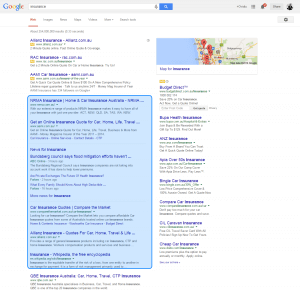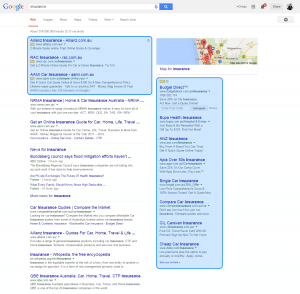Search Engine Optimisation (SEO)
 At the moment, looking through the website, no real effort or thought has gone into how to make this website and business find-able online. Google, and other search engines, essentially read through a website to determine what it’s about (using smart, automatic web crawlers). In order for search engines to even consider you for a search result, it has to find that you are relevant for that.
At the moment, looking through the website, no real effort or thought has gone into how to make this website and business find-able online. Google, and other search engines, essentially read through a website to determine what it’s about (using smart, automatic web crawlers). In order for search engines to even consider you for a search result, it has to find that you are relevant for that.
For example, let’s say someone is looking for a restaurant in Pemberton. For Google to even begin associating your website as a result to phrases like “Pemberton restaurant” or “restaurant in Pemberton”, your website needs to mention those phrases. If it does, Google will give you a ‘rank’ and position you accordingly. Initially this might be really low in the search results… you might have to go to page 2,3,4,5+ to find yourself – depending on the level of competition for that term.
This is where optimisation comes in.
-
- • First of all we need to conduct research to find a range of key phrases that someone might search in order to find you.
-
- • After choosing a range of key phrases, we examine the website to see if it has those already. If not, we add them in.
-
- • This may mean that new content or pages need to be created at this stage
-
- • Next time when the search engine bots come by, they will see those key phrases and start associating you as a result for those search terms
-
- • We will conduct further assessments on the pages to find as many aspects that we can improve on as possible (see attached example page grading document)
-
- • We implement as many of those items on an ongoing basis as possible – on the website page itself
-
- • We also build back links to the website – listing you on relevant websites with a link back to your website
-
- • Part of back linking is to also consult with your marketing team to provide suggestions on how to link back to your website if you are able to post articles to other people’s websites
-
- • Monthly tracking and reporting on the results of the above activities
-
- • Take a continuous improvement approach (depending on how aggressive competition is)
-
- Before any of the above items can be done, we need to do the following
-
- • Add in Google Analytics tracking into the website
-
- • Add in Google Webmaster Tools tracking into the website
- • Add in our Ranking Software tracking into the website
This will enable us to collect ongoing data about the website and track its movements in the search engines on a monthly basis.
AdWords
 Search engine optimisation can take time to build up, sometimes 3 to 6 months or longer – depending on the competitiveness of other businesses in the space (location and service).
Search engine optimisation can take time to build up, sometimes 3 to 6 months or longer – depending on the competitiveness of other businesses in the space (location and service).
AdWords is about placing you at the top of Google Rankings in the “Ads” sections. See illustration:
For these spots, competitors are paying a cost per click to be up there. So whenever someone clicks on that ad and goes to their website, they are paying for that click. The actual cost per click varies as it’s structured as an ever-changing bidding system. The business prepared to pay the most per click is most likely to be positioned higher. There are other factors involved, but this is largely it.
So with AdWords you need to pay for the set-up of the campaign (or DIY) and for the clicks themselves (direct to Google).
AdWords isn’t cheap, but it can get the phone ringing and enquiries coming in quickly. If a campaign is set up correctly, by the next day you should be a paid ad result.
SEO versus AdWords or both?
SEO is a more long-term activity. It takes longer to build up and costs more upfront (ongoing for several months) but once you are showing up in search results it quickly becomes cheaper than AdWords. For example, with AdWords you might be paying for the setup and ongoing maintenance plus the cost per click. So you might have a cost per click cost of $10. If you are getting 200 visitors to your website per month, it would be costing $2000 for that month. With SEO on the other hand, your costs remain the same ($1,000/month) but the longer and more effectively the campaign works, you might be getting 200 or 400 visitors to your website per month. $1000/month divided by 200 visitors is a cost per click of $5. Or $1000/month divided by 400 visitors is a cost per click of $2.5. Therefore the cost of SEO could be coming in at half or a quarter as compared to AdWords.
This is why business tend to favour SEO. Because you could get hundreds of clicks in a month. Not paying per click, like AdWords, makes the campaign a whole lot smarter.
For people who need to bring in business quickly, we suggest AdWords. However it can become a sizable monthly cost and if you stop the campaign, you are immediately off search results.
For people who want to build their natural SEO rankings, and not pay for each and every click, we suggest SEO.
For people who want to bring in business quickly and build up their SEO rankings for long term results and value, we suggest both SEO and AdWords. Once the SEO campaign is bringing in enough traffic and visitors, you can turn off AdWords.


